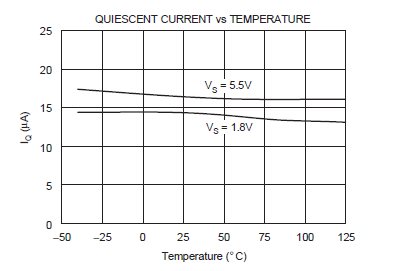Hello Champs,
My customer asked how to estimate Iq_max at 85C and 60C.
From the datasheet (SBOS522-JUNE 2010), Iq_max(Ta 25C) = 25uA, Iq_max(overtemperature) = 30uA.
And from the graph of “QUIESCENT CURRENT vs TEMPERATURE”, Iq is reverse proportional to temperature.
Q.1) Iq_max(overtemperature) is quiescent current at -40C?
Q.2) According to “QUIESCENT CURRENT vs TEMPERATURE” graph, Iq at 25C and 60C, and 85C are almost identical value. So is it reasonable to say Iq_max at 60C and 85C is 25uA?
Thanks and best regards,
Nobuo Fujihara


